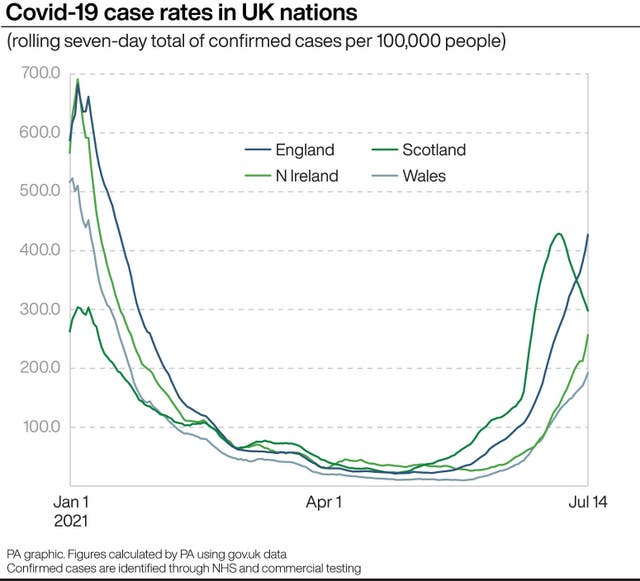PM ‘wrong’ to consider using self-isolation opt-out scheme, minister admits
Boris Johnson U-turned on using a pilot testing programme and is instead having to quarantine on England’s so-called ‘freedom day’.

The Prime Minister thought it would be “wrong” to use a pilot testing scheme to avoid having to self-isolate, the vaccines minister said, as he defended the decision to lift Covid-19 restrictions.
Boris Johnson is spending England’s so-called “freedom day”, with most legal restrictions now abolished, self-isolating at his official country residence at Chequers following a U-turn over an initial attempt to use an opt-out testing regime.
Mr Johnson and Chancellor Rishi Sunak – who were both “pinged” by NHS Test and Trace after coming into contact with Health Secretary Sajid Javid, who subsequently tested positive for the virus – initially tried to get round the requirement to quarantine by saying they would join a daily workplace testing programme being trialled by the Cabinet Office and No 10.
However, they were forced into a hasty reversal on Sunday amid widespread public anger at their “special treatment” while tens of thousands of people were being forced to miss work or school and stay home.
Vaccines minister Nadhim Zahawi said the Government “don’t get every decision right” and admitted the Prime Minister had to rethink his initial decision.
Asked on ITV’s Good Morning Britain whether an error had been made in announcing that the Cabinet ministers would take part in the pilot, Mr Zahawi said: “Of course, and as soon as the Prime Minister realised that this would be wrong, he came out very clearly and said ‘We will self-isolate, that’s the right thing to do’.”
Business Secretary Kwasi Kwarteng said the Prime Minister had “done the right thing” by self-isolating and denied that it had been “damaging” for the Downing Street incumbent to have considered taking part in the testing scheme, which is not widely available to the public.
Mr Johnson will self-isolate until July 26, which will include the final Prime Minister’s Questions before the Commons goes into recess, and the two-year anniversary of him entering No 10, which is on Saturday.
The Prime Minister is having to bunker down on Monday while having given those in England some of their freedoms back following more than a year of restrictions.

Face masks are no longer mandatory in shops and on public transport, limits on gathering have gone and the work-from-home guidance has ended.
Nightclubs – with people queuing across the country to hit the dance floors at one minute past midnight – theatres and restaurants can fully reopen while pubs are no longer restricted to table service only.
The UK Government’s decision to ease restrictions on social distancing and mask wearing, and replace it with guidance, comes as the country has already hit 50,000 Covid-19 cases a day.
Mr Zahawi said he was “confident” the Government was “doing the right thing” in lifting the measures but urged people to “respect” businesses and public transport providers insisting on mask wearing continuing.
Professor Andrew Hayward, a member of the Scientific Advisory Group for Emergencies (Sage), which advises ministers, stressed that if the public do not take a cautious approach to unlocking then “tens of thousands” of more people could die.
The University College London academic told Sky News: “We are heading into the biggest wave of Covid infection that we have ever seen and, even though the vaccine will substantially reduce the number of deaths and hospitalisations, it’s still likely that we will see somewhere in the low tens of thousands of deaths even if we are cautious.
“And that could move into the mid and high tens of thousands of deaths if we just went back to normal activity.”
Scotland’s First Minister Nicola Sturgeon was among those criticising Mr Johnson’s decision to go ahead with lifting restrictions in England.
The SNP leader said talk of “‘freedom day’ is not sensible” given the current infection rates.
The Scottish Government has decided to drop coronavirus measures to the lowest level of its five-tier system.
Face coverings in shops and public transport will remain mandatory for “some time to come” while social distancing will reduce to one metre inside public places as the shift to Level 0 kicks in, the First Minister has confirmed.
With the pandemic still raging, industries have complained of a shortage of staff due to hundreds of thousands of people being told to self-isolate in recent weeks in what is being called a “pingdemic”.
PureGym boss Humphrey Cobbold told BBC Radio 4’s Today programme that one in four of his staff had been notified to stay at home while Nick Mackenzie, chief executive of hospitality chain Greene King, told the programme 33 of the pubs his company run were shut last week due to staff shortages.
Richard Walker, managing director of supermarket chain Iceland, said: “We have got a 50% increase week on week in terms of people off and it’s a 400% increase compared to mid-June.”
But Mr Zahawi suggested there would be no changes to the NHS Covid app’s sensitivity in a bid to relax the pressure on the private sector.
However, the Government has announced that double-jabbed frontline NHS and social care staff will be able to skip self-isolation if they test negative for Covid using a PCR test.
There is also due to be an announcement in the House of Commons on Monday afternoon confirming that the Joint Committee on Vaccination and Immunisation (JCVI) has recommended that all vulnerable children and those under 18s living with at-risk adults should be given a vaccine.





